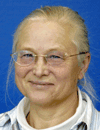Other Track AgendasCancer & Stem Cells | Cell Based Assays | Cell Culture | Circulating Tumor Cells | Flow Cytometry |

Tuesday, 22 January 201308:00 | Registration | |
CTCs as Prognostic or Predictive Biomarkers for Cancer |
| | 09:00 |  | Keynote Presentation The Isolation and Characterization of Brain Metastasis – Competent Breast Cancer CTCs
Dario Marchetti, Endowed Professor, Baylor College of Medicine, United States of America
Mechanisms of fatal brain metastatic breast cancer (BMBC) are largely unknown. Similarly, properties and biomarker identification of circulating tumor cells (CTCs), the “seeds” of metastasis, remain elusive. Here we report novel strategies investigating CTCs isolated from peripheral blood mononuclear cells (PBMCs) of patients with BMBC, including the development and characterization of CTC lines. We identified a unique BMBC CTC signature (HER2+/EGFR+/HPSE+/Notch1+/EpCAM-) by investigating CTCs that could not be captured by the FDA-approved Veridex CellSearchTM platform (EpCAM - negative CTCs). Second, we analyzed the invasive and metastatic competencies of isolated CTCs. Established CTC lines over-expressing the BMBC signature were highly invasive and capable to form brain metastasis in xenografts. Third, tumor cell morphologies of CTC - induced metastases closely resembled those of pathologically assessed tumors of patients whose blood was source of isolated CTCs. Fourth, the expression of proteins of the BMBC signature was detected in CTC - induced BMBC. Collectively, we provide first-time evidence of human CTCs isolation and long-term growth, the establishment of CTC lines, and CTC metastatic competency in the presence of a biomarker signature necessary to promote BMBC. |
| 10:00 | Expanding the Definition of Traditional CTCs: Cells Associated With Cancer in the Blood of Patients with Solid Tumors
Jeff Chalmers, Director, The Ohio State University, United States of America
| 10:30 | Coffee and Networking in Exhibiton Hall | 11:15 | CTCs: Analysis of Market Trends and Clinical Utility
Enal Razvi, Managing Director, Select Biosciences Inc, United States of America
Select Biosciences has been tracking the circulating tumor cells (CTCs) marketplace from the perspective of technology trends, market trends, and analysis of clinical utility. This presentation presents a snapshot of our most up-to-date market analyses excerpted from Select Biosciences Circulating Tumor Cells 2013 Market Report. | 11:45 | Biomarker Detection on CTCs to Guide Therapeutic Choices
Lidia Sambucetti, Senior Director, SRI International, United States of America
The FAST (Fiber-optic array scanning technology) system locates CTCs while rapidly scanning blood cells on a planar substrate, enabling high-throughput, high-content scanning of fluorescently labeled CTCs. We are developing biomarker analysis on CTCs for use in the selection of treatment options for cancer patients. | 12:15 | Lunch and Networking in Exhibition Hall | 13:30 | Poster Viewing Session | |
Isolation and Analysis of CTCs: Emerging Technologies Impacting the Field |
| | 14:15 | Novel Technology Approaches for Capture and Characterization of Circulating Tumor Cells
Henry Lin, Graduate Student, University of California, United States of America
A novel microfilter-based technology for CTC detection, enumeration and characterization will be discussed. This platform incorporates useful functionalities including immunofluorescence, FISH, DNA/RNA isolation etc., allowing identification of therapeutic targets. | 14:45 | Fluid Phase of Solid Tumors: Using CTCs as a Real Time Fluid Biopsy
Anand Kolatkar, Researcher, Scripps Research Institute, United States of America
The presentation will discuss the development of a fluid phase biopsy platform to detect rare cells in human blood focusing specifically on detection of circulating tumor cells (CTCs) in patient samples. | 15:15 | Coffee and Networking in Exhibiton Hall | 16:00 | NanoVelcro Embedded Microchips for Detection and Isolation of Circulating Tumor Cells: Validation Studies in Oncology Clinic
Hsian-Rong Tseng, Professor, Crump Institute for Molecular Imaging, California NanoSystems Institute, University of California-Los Angeles, United States of America
| |
Novel Methods for Detection and Profiling |
| | 16:30 | EPHESIA: A Microfluidic-magnetic Strategy for Capture and Multimodal Typing of CTC
Jean-Louis Viovy, Group Leader, Institut Curie, France
The EPHESIA technology consists in self-assembling in a high throughput microfluidic device, an array of antibody-bearing magnetic particles. It allows capture with multiple antibodies, and high resolution imaging and multimodal typing in situ, in a fully automated way (immunophenotype, morphology, FISH). Capture efficiencies consistently above 90% were validated on cell lines, and preliminary clinical validations will be presented in the talk. | 17:00 | Isolation and Genomic Interrogation of Invasive Circulating Tumor Cells (iCTCs) and Invasive Tumor Progenitor Cells (iTPCs) Derived from Men with Metastatic Castration Resistant Prostate Cancer (CRPC)
Pamela Paris, Associate Professor, University of California San Francisco, United States of America
| 17:30 | End of Day One |
Wednesday, 23 January 2013 |
Significance of CTCs in Various Types of Cancer: Liquid Tumors vs. Solid Tumors |
| | 09:00 |  | Keynote Presentation Growth of Tumorspheres from Peripherally Circulating Tumor Cells
Katharina Pachmann, Professor, University of Jena, Germany
Demostration of tumor suspect cells, detected in our approach, contain a subpopulation with stem cell-like properties capable of growing into tumorspheres. The frequency and growth potential of cells capable of forming spheres seems to be dependent from the properties of the primary tumor. The possibility to grow tumorspheres from peripherally circulating tumor cells may open up a new field, where the relevant cells with stem cell properties from individual patients can now be specifically analysed further for genetic endowment, transcriptional activity, heterogeneity and stem cell markers. |
| 10:00 | Genomic Characterization of CTC in Melanoma Patients
David Hoon, Professor, Director Department of Translational Molecular Medicine, John Wayne Cancer Institute, United States of America
We have demonstrated in two phase III multicenter clinical trials the prognostic utility of CTC in melanoma patients. Recently, we have isolated CTC and genomically profiled the CTC to identify significant CNVs that have potential prognostic utility. | 10:30 | Coffee and Networking in Exhibiton Hall | 11:15 | Circulating Tumor Antigens and their Autoantibody Reactivity as Cancer Markers
Sam Hanash, Director, McCombs Institute for Cancer Detection and Treatment, University of Texas MD Anderson Cancer Center, United States of America
| 12:15 | Lunch and Networking in Exhibition Hall | 13:30 | Poster Viewing Session | |
The use of Circulating Tumour Cells in Clinical Development |
| | 14:15 | Implementation of CTC Assays in Oncology Clinical Trials
Iman Jilani, Associate Director, Pfizer Inc, United States of America
This presentation will discuss the incorporation of CTC assays in Oncology clinical trials. Content will include choosing a platform , method development, validation, and clinical trial implementation. | |
Understanding the Role of EMT in Metastasis |
| | 14:45 | Using Lineage Labeling to Study the Kinetics and Functional Implications of EMT in Dissemination and Metastasis in vivo
Andrew Rhim, Instructor of Medicine, University of Pennsylvania School of Medicine, United States of America
Epithelial to mesenchymal transition (EMT) is thought to be critical in metastasis, though this had not been shown in vivo. We generated a novel in vivo system that allows for unbiased and detailed analysis of CTCs and metastases that allowed us to address this question in a unique manner. | 15:15 | Coffee and Networking in Exhibiton Hall | 15:45 | Close of Conference |
|

 Add to Calendar ▼2013-01-22 00:00:002013-01-23 00:00:00Europe/LondonCirculating Tumor CellsSELECTBIOenquiries@selectbiosciences.com
Add to Calendar ▼2013-01-22 00:00:002013-01-23 00:00:00Europe/LondonCirculating Tumor CellsSELECTBIOenquiries@selectbiosciences.com